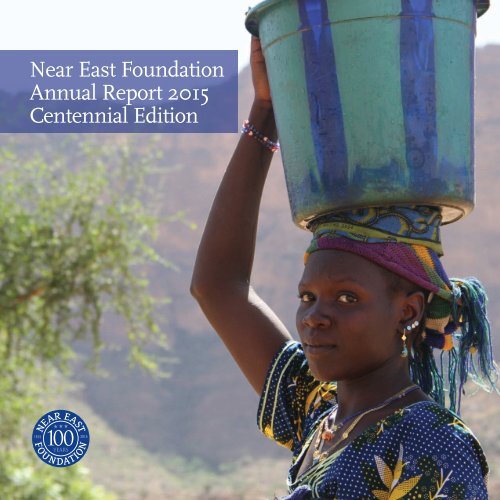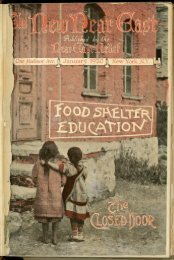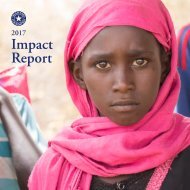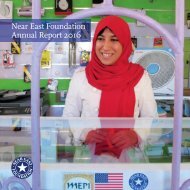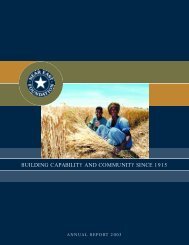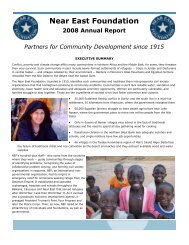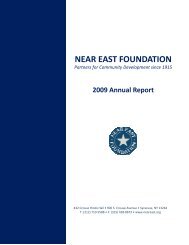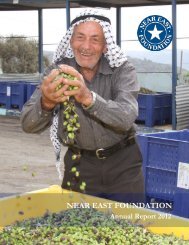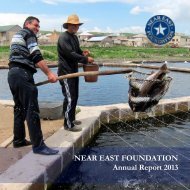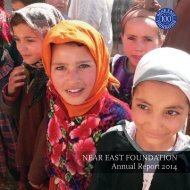Near East Foundation 2015 Annual Report
You also want an ePaper? Increase the reach of your titles
YUMPU automatically turns print PDFs into web optimized ePapers that Google loves.
<strong>Near</strong> <strong>East</strong> <strong>Foundation</strong><br />
<strong>Annual</strong> <strong>Report</strong> <strong>2015</strong><br />
Centennial Edition
Contents<br />
4 Who We Are<br />
6 Microenterprise Development<br />
10 Building Peace<br />
13 Natural Resource Management<br />
19 Financials<br />
20 Acknowledgements
A Message from the NEF Board and President<br />
How to celebrate 100 years of service is a question few<br />
organizations have an opportunity to ask. Our answer? Bring<br />
together nearly 400 loyal supporters, past and present board<br />
members, historically connected families, dignitaries, clergy,<br />
project partners, honorary council members, local and country<br />
staff, and new friends to pay tribute to the incredible men and<br />
women who brought the <strong>Near</strong> <strong>East</strong> <strong>Foundation</strong> to life—and<br />
pioneered international development for an entire century. We<br />
are grateful to all those who shared our special Centennial Gala<br />
Celebration in October as we marked this momentous milestone<br />
in NEF’s history.<br />
This is a time of reflection for NEF, as we look back with<br />
pride and humility on all that NEF has accomplished during a<br />
century of service. It is also a time of escalating challenges for<br />
the most vulnerable populations that we serve in the Middle <strong>East</strong><br />
and Africa. Last year, driven in large part by civil war in Syria, the<br />
number of displaced persons in the world reached 60 million—<br />
more than at any time since the second world war.<br />
While immediate aid is important, protracted crises have<br />
required humanitarian organizations to shift their perspectives<br />
from relief to resilience and economic security. With its on-theground<br />
teams and a 100-year presence in the region, NEF has<br />
been at the cutting edge of introducing cost-effective actions<br />
with both immediate and long-term impacts on the well-being<br />
of displaced people, as well as vulnerable members of their host<br />
communities, by providing the means for them to meet their<br />
basic needs with dignity.<br />
As a development organization working in an area of great<br />
turmoil, NEF plays a unique and important role in helping<br />
sustain progress in the face of a dramatic rise in humanitarian<br />
need. For instance, NEF teams are assisting refugees from Syria<br />
and Iraq—who have found safe haven in Jordan and Lebanon—<br />
with skills training and resources to recover their livelihoods.<br />
NEF also is supporting those displaced by militias and jihadists<br />
in Mali rebuild their agricultural infrastructure and restart small<br />
businesses. In war-torn communities in Darfur, the foundation<br />
is working to restore sustainable agriculture and vibrant local<br />
economies.<br />
NEF continues to confront the root causes of poverty and<br />
conflict in the Middle <strong>East</strong> and Africa—ongoing conflict, income<br />
insecurity, youth disenfranchisement and unemployment, climate<br />
change, and inequality—by creating opportunities for economic<br />
development, conflict management, political participation,<br />
and self-improvement. This annual report highlights NEF’s<br />
accomplishments over the past year.<br />
NEF’s success over the past 100 years shows that modest<br />
investments can have a transformative effect on individuals,<br />
communities, and ultimately entire nations. In turmoil there also<br />
is great opportunity for positive change and for people like you to<br />
have a lasting impact. That is as true today as it was a century ago.<br />
With Sincere Gratitude,<br />
Charles Benjamin, Ph.D.<br />
President<br />
Shant Mardirossian<br />
Board Chairman<br />
Robert J. Solomon<br />
Chairman Elect<br />
1 | NEF <strong>2015</strong> <strong>Annual</strong> <strong>Report</strong>
A Century of Caring<br />
<strong>Near</strong> <strong>East</strong> <strong>Foundation</strong> Celebrates 100 Years of Service<br />
The <strong>Near</strong> <strong>East</strong> <strong>Foundation</strong> (NEF)—originally known as <strong>Near</strong> <strong>East</strong><br />
Relief—was founded in 1915 at the urging of President Woodrow<br />
Wilson and Ambassador Henry Morgenthau to rescue thousands<br />
of Armenian, Greek, and Assyrian refugees displaced by the<br />
collapse of the Ottoman Empire and the Armenian Genocide.<br />
This effort launched the first mass American action to send<br />
humanitarian aid overseas, driven by the conviction that ordinary<br />
citizens—contributing what they could afford—had the collective<br />
power to save the lives of people coping with unimaginable<br />
adversity.<br />
Over the past century, NEF has played a central role in<br />
shaping the American philanthropic humanitarian tradition<br />
by partnering with communities in nearly 50 countries to<br />
improve millions of lives. In addition to responding to the great<br />
humanitarian needs of the day, NEF has also transcended them<br />
with a long-term vision of helping people help themselves.<br />
In 1930, the organization shifted its emphasis from relief<br />
to development in the communities it served. In fact, NEF’s<br />
ground-breaking work in social and economic development<br />
served as a model for such programs as the Marshall Plan, Peace<br />
Corps, and Truman’s Point Four Program (precursor to USAID).<br />
The spirit of humanitarianism that grew out of this citizen<br />
philanthropy movement enables NEF to continue to help<br />
families across the region build sustainable, prosperous, and<br />
inclusive communities today.<br />
“Who would have thought that the grandson<br />
of one of the orphans that was rescued by<br />
the <strong>Near</strong> <strong>East</strong> <strong>Foundation</strong> would one day<br />
become its chairman and lead the organization<br />
through its centenary? It just goes to show<br />
that saving even one life has a ripple effect on<br />
the generations that follow.”<br />
Shant Mardirossian<br />
NEF Chairman at Centennial Gala<br />
<strong>Near</strong> <strong>East</strong> Relief Historical Society<br />
In 2014, NEF created the <strong>Near</strong> <strong>East</strong><br />
Relief Historical Society to raise<br />
awareness about this important chapter<br />
in NEF’s history and to pay tribute to<br />
NEF’s founders, relief workers, and<br />
beneficiaries.<br />
For more information or to support<br />
this project visit:<br />
www.neareastmuseum.com<br />
NEF <strong>2015</strong> <strong>Annual</strong> <strong>Report</strong> | 2
Centennial Celebration<br />
The <strong>Near</strong> <strong>East</strong> <strong>Foundation</strong> held its Centennial Gala in October<br />
<strong>2015</strong> in New York City to mark 100 years of service and<br />
pioneering work in the Middle <strong>East</strong> and Africa.<br />
In commemorating its history, NEF paid tribute to the many<br />
individuals who have contributed to its legacy throughout the<br />
years. The evening’s reoccurring theme focused on NEF’s<br />
Centennial Initiative, which was launched to help Syrian and<br />
Iraqi refugees, as well as vulnerable members of their host<br />
communities in Jordan and Lebanon, build economic resilience<br />
through small business development, financial literacy, conflict<br />
management, and social networking.<br />
The evening also highlighted NEF’s newly formed<br />
partnership with 100 LIVES—the Gratitude Scholarship<br />
Program, valued at nearly $7 million over eight years. NEF and<br />
100 LIVES will provide 100 academic scholarships to youth<br />
from the Arab Middle <strong>East</strong> who have been affected by conflict,<br />
displacement, and poverty. The scholarships will provide talented<br />
young people with an opportunity to receive an internationalcaliber<br />
education at one of the United World College schools.<br />
“The <strong>Near</strong> <strong>East</strong> <strong>Foundation</strong> is proud to celebrate its centennial<br />
anniversary by enabling 100 driven and in-need students to<br />
receive a world-class education. We are excited to join 100<br />
LIVES in rewarding talented students and future leaders the<br />
opportunity to excel and succeed.”<br />
Charles Benjamin, NEF President<br />
3 | NEF <strong>2015</strong> <strong>Annual</strong> <strong>Report</strong>
Who We Are<br />
Our Mission<br />
The <strong>Near</strong> <strong>East</strong> <strong>Foundation</strong> helps build more sustainable,<br />
prosperous, and inclusive communities in the Middle <strong>East</strong> and<br />
Africa through education, community organizing, and economic<br />
development.<br />
Our Vision<br />
To address the immediate needs of vulnerable, conflict-affected<br />
people while enabling their self-sufficiency and economic<br />
resilience.<br />
Our Approach<br />
Empowerment and Self-Sufficiency<br />
• Identify local needs and priorities through deep relationships<br />
and trust with communities.<br />
• Build the capacity of local communities to solve their own<br />
development challenges through long-term solutions.<br />
• Invest in local people, organizations, and governance systems<br />
to deliver inclusive, sustainable solutions that are appropriate<br />
to the local context.<br />
Knowledge, Voice, Enterprise<br />
At the heart of everything NEF does is the conviction<br />
that for people to participate in the development of their<br />
communities and countries they need: KNOWLEDGE<br />
to participate effectively in civic and economic life; a<br />
VOICE in public decisions that affect their well-being;<br />
and meaningful and dignified ways to make a living—<br />
ENTERPRISE.<br />
<strong>Near</strong> <strong>East</strong> <strong>Foundation</strong> UK<br />
NEF UK was established in 2012 to advance the shared values and<br />
mission of NEF. Guided by an independent Board of Directors, NEF UK<br />
shares a common vision and approach to building more sustainable,<br />
prosperous, and inclusive communities through economic development,<br />
community organizing, and education.<br />
Current programs are improving children’s access to primary school<br />
in Morocco, helping survivors of gender-based violence in Armenia<br />
gain economic independence, promoting reconciliation and economic<br />
development in war-torn regions of Sudan, and supporting aspiring<br />
women entrepreneurs in Palestine to grow their businesses.<br />
For more information visit: www.neareast.org/uk<br />
NEF <strong>2015</strong> <strong>Annual</strong> <strong>Report</strong> | 4
Where We Work<br />
Microenterprise Development<br />
Women and youth are assuming increasing<br />
economic responsibility for their families. In<br />
spite of the necessity, they must overcome<br />
social barriers, lack of job skills or business<br />
management experience, and limited access<br />
to credit. Microenterprise development is<br />
among the most effective and accessible ways<br />
to create jobs and income for disadvantaged<br />
people in the region.<br />
LEBANON<br />
ARMENIA<br />
Peacebuilding through Economic Cooperation<br />
MOROCCO<br />
PALESTINE<br />
NEF’s approach focuses on core livelihood<br />
issues in a given area and helps populations<br />
find mutual interests to benefit through<br />
economic cooperation. By focusing on these<br />
issues, NEF frames conflict mitigation and<br />
reconciliation in terms of practical and<br />
immediate concerns for average citizens.<br />
MALI<br />
SUDAN<br />
JORDAN<br />
Natural Resource Management and<br />
Adaptation to Climate Change<br />
NEF enables communities to use resources<br />
more efficiently and better prepare for<br />
shocks caused by a rapidly changing climate.<br />
Harnessing nonconventional water resources,<br />
such as rainwater harvesting, spring<br />
catchment, and wastewater reuse; introducing<br />
water-efficient crops; and adopting improved<br />
irrigation technologies, NEF is increasing local<br />
capacity to manage agriculture and natural<br />
resources sustainably in the long-term.<br />
SENEGAL<br />
5 | NEF <strong>2015</strong> <strong>Annual</strong> <strong>Report</strong>
MICROENTERPRISE DEVELOPMENT<br />
NEF takes a community-based approach to inclusive economic<br />
development by working with and through local associations to<br />
create such platforms as ongoing training programs, business<br />
incubators, start-up funds, and credit products to help economically<br />
marginalized people gain the business skills and resources<br />
they need to start small businesses of their own. In particular,<br />
women and youth often face enormous social, legal, and cultural<br />
barriers to entrepreneurship and employment. In fact, youth<br />
unemployment in the Middle <strong>East</strong> and North Africa is almost 30<br />
percent. Only 32 percent of women participate in the labor force<br />
and in paid employment, while 72 percent of young women who<br />
are currently outside of the labor market want to work.<br />
Empowering women’s participation in the<br />
workforce greatly enhances productivity and<br />
fosters economic growth.<br />
Working in partnership with community-based associations,<br />
NEF prepares master trainers to organize ongoing educational<br />
programs, set up business incubators, facilitate peer support<br />
networks, and provides funding to help women and youth launch<br />
small businesses. In parallel, NEF offers young people training<br />
in job skills, life skills, and financial literacy to help them find<br />
and keep employment.<br />
When women earn, they invest 90% of those earnings back into their households—spending<br />
more money on food, housing, and education.<br />
ONGOING<br />
MONITORING<br />
AND SUPPORT<br />
PARTICIPATORY<br />
ASSESSMENTS<br />
NETWORKING<br />
MICROENTERPRISE<br />
DEVELOPMENT<br />
TRAINING/SKILLS<br />
DEVELOPMENT<br />
STARTUP<br />
FUNDING<br />
BUSINESS PLAN<br />
DEVELOPMENT<br />
SUPPORT<br />
NEF <strong>2015</strong> <strong>Annual</strong> <strong>Report</strong> | 6
Jordan and Lebanon<br />
As the Syrian crisis enters its fifth year, millions of refugees<br />
continue to seek safety and dignified lives in Jordan and<br />
Lebanon. Currently, Jordan hosts more than 600,000 registered<br />
Syrian refugees, and in Lebanon, approximately 1.07 million<br />
registered Syrian refugees constitute 25 percent of the country’s<br />
population. NEF is assisting Syrian and Iraqi refugees, and<br />
vulnerable members of their host communities, to achieve<br />
economic resilience by helping them expand or launch homebased<br />
microenterprises, build peer support networks, and<br />
establish savings and loan associations.<br />
NEF’s microenterprise work in Jordan and Lebanon is funded<br />
by the U.S. Department of State-Bureau of Population<br />
Refugees, and Migration (BPRM), Embassy of Taiwan in<br />
Amman, MEDAIR, and the Cleveland H. Dodge <strong>Foundation</strong>.<br />
<strong>2015</strong> HIGHLIGHTS<br />
• 1,034 Jordanians and Iraqi and Syrian refugees received<br />
training in business development, vocational skills, and<br />
financial literacy.<br />
• In Jordan, 833 women started home-based businesses,<br />
increasing their household incomes by an average of 64%<br />
(75% among refugees).<br />
“I was having some trouble with the purchasing of raw materials<br />
and with the calculation of costs. The training was clear and easy.<br />
I learned to plan, calculate capital, and deal with customers.”<br />
— Lutfiyeh Iskander, sweets and handicrafts producer who has<br />
successfully grown her at-home business<br />
Microenterprise Development by the Numbers<br />
PROCESS<br />
OUTCOME<br />
Total<br />
4,872<br />
Total<br />
2,740<br />
Total<br />
4,179<br />
Total<br />
3,721<br />
Total<br />
426<br />
3,542<br />
• Women: 3,708<br />
• Youth: 586<br />
• Women: 2,381<br />
• Youth: 359<br />
• Women: 3,509<br />
• Youth: 670<br />
• Women: 3,226<br />
• Youth: 255<br />
• Women: 330<br />
• Youth: 40<br />
$<br />
People trained in<br />
business development,<br />
financial literacy, or<br />
vocational skills<br />
Business plans<br />
developed by<br />
women and youth<br />
Grants provided<br />
to help expand or<br />
start businesses<br />
Small businesses<br />
started or recovered<br />
(post-conflict)<br />
New jobs created<br />
Households with<br />
increased income<br />
7 | NEF <strong>2015</strong> <strong>Annual</strong> <strong>Report</strong>
Armenia<br />
Domestic violence is widespread in Armenia, where 59 percent<br />
of women report being subjected to physical, psychological,<br />
or sexual violence at the hands of their domestic partners. By<br />
2017, NEF aims to help more than 250 women survivors of<br />
gender-based violence achieve economic independence through<br />
vocational training, entrepreneurship skill building, and business<br />
and financial support to help them launch small businesses.<br />
Working with community associations in four regions, NEF<br />
has organized policy roundtables and public forums to raise<br />
awareness and start dialogue around gender-based violence and<br />
inequality.<br />
NEF’s microenterprise work in Armenia is funded by the<br />
European Commission, Open Society <strong>Foundation</strong>s, and the<br />
Dan and Stacey Case Family <strong>Foundation</strong>.<br />
“You changed my family’s outlook—women are not<br />
created only for sitting at home, but also for working<br />
and earning.”<br />
— Armenian woman who received vocational training and is now<br />
working as a hairdresser<br />
<strong>2015</strong> HIGHLIGHTS<br />
• 57 women received career development training and<br />
coaching.<br />
• 59 women received business development training and<br />
coaching.<br />
• 48 women developed business plans, of which 36 received<br />
grants to support their businesses.<br />
Palestine<br />
Although women are key players in the Palestinian economy,<br />
Palestine has one of the lowest female labor participation rates in<br />
the world. Hindered by social norms, limited access to financial<br />
resources, and lack of institutional support, the role of women in<br />
the economy is largely informal and uncompensated. Despite their<br />
high levels of education, women account for only 19 percent of the<br />
Palestinian labor market, while 65 percent express a desire to own<br />
a business. In addition to helping launch start-up businesses in<br />
rural areas, NEF focuses on the “missing middle” of women who<br />
have existing businesses ready to be taken to scale.<br />
NEF works in partnership with the Cherie Blair <strong>Foundation</strong> for<br />
Women and with the support of the Oak <strong>Foundation</strong> and the<br />
Trafigura <strong>Foundation</strong>. The Rangoonwala <strong>Foundation</strong> supports<br />
NEF’s work in women’s microenterprise and microfranchising.<br />
<strong>2015</strong> HIGHLIGHTS<br />
• 524 women received business development training and<br />
coaching; 311 developed business plans.<br />
• 267 women launched or significantly expanded businesses.<br />
• Women entrepreneurs created 330 new jobs for women.<br />
25% of households in the West Bank live<br />
below the poverty line.<br />
“One day I will have a brand name and stores in each city here<br />
in Palestine. Who knows? Maybe I will export Sana Sweets<br />
internationally.”<br />
— Sana Al-Sayeh, Palestinian woman who expanded her candymaking<br />
business with NEF support<br />
NEF <strong>2015</strong> <strong>Annual</strong> <strong>Report</strong> | 8
Sudan<br />
Reoccurring conflict in Sudan has destroyed economic<br />
institutions, markets, and jobs, leaving 46.5 percent of the<br />
population in poverty. Unemployment continues to be one of the<br />
major issues facing women and youth. NEF promotes peaceful<br />
and participatory economic recovery among internally displaced,<br />
returnees, and vulnerable populations in Sudan through<br />
microenterprise development and income-generating activities.<br />
<strong>2015</strong> HIGHLIGHTS<br />
• 2,330 people, including 1,375 women, in Central Darfur<br />
received training in business development and management;<br />
917 prepared business plans and started new enterprises.<br />
• 77 at-risk women in Khartoum’s peri-urban slums started<br />
or expanded small businesses based on NEF vocational<br />
and life skills trainings.<br />
• 40 young women and 60 young men in Al-Qoz and<br />
Delling in South Kordofan received vocational skills<br />
training to increase employment opportunities and build<br />
economic resilience; 60 of them have already reported<br />
improved income.<br />
• 2 women’s centers were constructed in Central Darfur to<br />
provide microenterprise facilities for women.<br />
“Before attending the workshop, life was very difficult because I<br />
didn’t have a real full-time job. Now I can practice a profession<br />
I feel is my true calling. My personal financial distress has been<br />
completely relieved. And my children are doing well at school as a<br />
result of my economic stability.”<br />
— Kharif Abdulla, an NEF-trained para-veterinarian from<br />
Central Darfur<br />
NEF’s microenterprise work in Sudan is funded by AECOM,<br />
UNAMID, USAID, OFDA, UNFPA, and UNDP.<br />
Morocco<br />
With more than 50 percent of Morocco’s young working-age<br />
population out of school and out of work, youth unemployment<br />
is a serious concern. Working with youth councils in two coastal<br />
provinces, NEF is organizing business training programs,<br />
incubators, and support networks to help young people start<br />
their own businesses in the formal sector. NEF’s strategy with<br />
the councils is to put people, resources, and funding in place to<br />
sustain and expand business creation among young people.<br />
In parallel, NEF is working with Parent Teacher Associations<br />
in the High Atlas Mountains to establish small businesses that<br />
will generate funds to invest in improving access to quality<br />
education and better engage communities in their schools.<br />
<strong>2015</strong> HIGHLIGHTS<br />
• 486 youth completed entrepreneurship training.<br />
• 67 business plans have already been funded and 21 have<br />
launched with a target of 250 by the end of 2016.<br />
“My involvement in this project has shown me the important role<br />
that young people can play as a catalyst for the economy. I have<br />
learned new skills and teamwork, and have had an opportunity to<br />
share my experience.”<br />
— Amine El Bouazzi, a 24-year-old master trainer certified through<br />
NEF’s youth entrepreneurship program<br />
NEF’s microenterprise work in Morocco is funded by the U.S.<br />
State Department’s Middle <strong>East</strong> Partnership Initiative (MEPI),<br />
the Big Lottery Fund, and the World Bank through CARE Morocco.<br />
9 | NEF <strong>2015</strong> <strong>Annual</strong> <strong>Report</strong>
BUILDING PEACE<br />
Conflict is the backdrop to daily life in many of the communities<br />
where NEF works. While conflict expresses itself in many<br />
ways—warfare, competition over natural resources, occupied<br />
lands, or disaffection—poverty is a significant underlying cause<br />
and consequence. From Sudan, where one-quarter of the world’s<br />
internally displaced people live, to Palestine, where years of<br />
conflict continue to shape everyday life, NEF’s peace-building<br />
programs simultaneously strengthen economic cooperation and<br />
development and promote reconciliation among groups<br />
in conflict.<br />
Building peace requires opportunities for collaboration<br />
around issues of common concern and mutual benefit that<br />
will help break down barriers, build relationships and trust,<br />
and establish a foundation to achieve and sustain peace.<br />
As a vehicle to reduce conflict, NEF facilitates grassroots<br />
economic cooperation by introducing innovative approaches to<br />
reconciliation through value chain development, collaborative<br />
natural resource management, and economic reintegration of<br />
internally displaced people and ex-combatants. NEF’s work helps<br />
groups move beyond conflict to achieve stability and prosperity.<br />
Develop mutual<br />
understandings<br />
of opportunities<br />
and constraints<br />
Develop<br />
relationships of<br />
trust through<br />
ongoing<br />
communication<br />
and face-to-face<br />
interactions<br />
Economic<br />
Cooperation &<br />
Shared Natural<br />
Resource<br />
Management<br />
Work together<br />
toward mutual<br />
economic and<br />
social benefits<br />
NEF <strong>2015</strong> <strong>Annual</strong> <strong>Report</strong> | 10
Palestine<br />
In Palestine, more than 100,000 families depend on the olive<br />
oil industry, which accounts for 10 percent of GDP. Through<br />
the Olive Oil Without Borders (OOWB) program, NEF has<br />
worked with more than 3,400 olive oil stakeholders (olive<br />
growers, mill operators, intermediaries, and distributors) across<br />
58 communities in Israel and Palestine. By providing training,<br />
technical support, modern equipment, and opportunities for<br />
cross-border dialogue, strategic planning, and trade, NEF helps<br />
build relationships for collaboration and trust through the<br />
development of the region’s olive sector—and broader economy.<br />
NEF has now expanded this work into additional sectors,<br />
working with Israeli and Palestinian youth to start joint crossborder<br />
agricultural businesses. In so doing, they create jobs,<br />
generate income, and grow local markets while gaining hands-on<br />
experience in business cooperation and conflict management.<br />
NEF’s peacebuilding work in Palestine is funded by USAID.<br />
“I believe that tomorrow…next year…we will sell together.<br />
One bottle from Israel, and one bottle from the Palestinians.”<br />
— Simha Helbrin, Israeli farmer and olive oil producer<br />
“I benefit from my relationship with Simha because he is an<br />
experienced farmer. We exchange experiences farmer to farmer,<br />
away from politics. The land is our life. It’s everything. We were<br />
born on it, lived and grew on it, and we will die on it. Our dream is<br />
to educate our kids, plant our land, and live in peace.”<br />
— Nahed Kayed, Palestinian olive farmer<br />
<strong>2015</strong> HIGHLIGHTS<br />
• A cross-border trade policy developed in 2013 through<br />
OOWB opened the border to olive trade for the first time<br />
in 10 years; since then, Palestinian farmers exported 4,500<br />
metric tons of olive oil to Israel, generating $25 million in<br />
new income for farmers as well as increased profits across<br />
the value chain.<br />
• 117 Israeli and Palestinian youth participated in crossborder<br />
training workshops and field trips; 51 joint crossborder<br />
business plans have been submitted to NEF for<br />
funding; 33 businesses have been launched.<br />
• 90% of OOWB participants report a more positive<br />
perception of “the other” and increased optimism about<br />
cross-border relationships.<br />
11 | NEF <strong>2015</strong> <strong>Annual</strong> <strong>Report</strong>
Sudan<br />
Violent conflict often arises over the use and distribution of<br />
such essential natural resources as land and water. In Central<br />
Darfur, NEF works with ethnically and economically diverse<br />
communities in Darfur and South Kordofan to introduce new<br />
tools—such as “supra-village” associations, local conventions,<br />
and land use management plans—for sharing natural resources<br />
more effectively and for promoting inclusive and sustainable<br />
economic and social development. NEF-supported communities<br />
have been able to work together to improve natural resources<br />
through a variety of initiatives, including community water<br />
sources, demarcation of animal migration corridors, and<br />
enrichment of pasture areas used for grazing.<br />
NEF’s peace-building work in Sudan is funded by USAID,<br />
AECOM, the European Union, UNDP, and UNAMID.<br />
<strong>2015</strong> HIGHLIGHTS<br />
• 7,625 people benefited from enrichment planting, water<br />
harvesting, and the demarcation of 11,300 hectares of<br />
animal migration corridors.<br />
• 100 young adults received training in mediation and<br />
conflict prevention in Central Darfur.<br />
• 500 young Darfuris, representing 35 ethnic groups,<br />
created “Tribes for Peace in Darfur,” a dynamic new<br />
youth movement advocating for reconciliation and peace<br />
throughout Central Darfur State; they have been active<br />
in mediating disputes and were directly responsible for<br />
reopening two major regional marketplaces that had been<br />
closed due to conflict.<br />
“NEF has come up with very innovative activities. These activities<br />
really have made an impact and we have seen that during this<br />
harvesting season the number of conflicts between farmers has<br />
reduced.”<br />
— Mohamed Isehag Mohamed, Vice Chief of Abata<br />
Farmers, pastoralists, local government<br />
officials, and other actors in Central Darfur<br />
have all acknowledged the role that the<br />
demarcation, enrichment planting, water,<br />
and awareness raising activities will have in<br />
preventing disputes and reducing conflict.<br />
NEF <strong>2015</strong> <strong>Annual</strong> <strong>Report</strong> | 12
NATURAL RESOURCE MANAGEMENT AND<br />
ADAPTATION TO CLIMATE CHANGE<br />
Beyond achieving short-term impacts, NEF helps develop local<br />
capacity, infrastructure, and institutions to manage agriculture<br />
and natural resources sustainably in the long term. NEF<br />
supports vulnerable communities—those emerging from years<br />
of devastating drought and conflict and those suffering from<br />
chronic poverty—to achieve sustainable economic recovery<br />
through agricultural production and collaborative natural<br />
resource management.<br />
NEF builds resilience among communities through a wide<br />
variety of approaches tailored to local conditions, including:<br />
rainwater harvesting, treated wastewater reuse, improved<br />
irrigation, water efficient crops, community veterinarian training,<br />
seed distribution, soil and water conservation, aquatic grassland<br />
restoration, community forestry, climate-smart agriculture,<br />
decentralized climate adaptation funds, and value-chain<br />
development.<br />
Women play a vital role in advancing agricultural development and food security but have<br />
the potential to make a much greater contribution when they are able to organize effectively,<br />
access improved inputs, and participate in local markets.<br />
13 | NEF <strong>2015</strong> <strong>Annual</strong> <strong>Report</strong>
Mali and Senegal<br />
Agriculture is the cornerstone of Mali’s economy, with more than<br />
80 percent of its people dependent on agricultural activities for<br />
their livelihood. In the unpredictable environment of the Sahel,<br />
Malian and Senegalese communities face critical challenges<br />
due to degraded environments, low productivity, crop losses,<br />
underdeveloped markets, and long-term climate change. Food<br />
security and economic growth depend on addressing these<br />
threats. Some of the most vulnerable groups in the Sahel are<br />
smallholder farmers, who are on the frontlines of climate change<br />
yet often lack access to the information, tools, and infrastructure<br />
to successfully adapt. NEF supports these farmers and other<br />
natural resource-dependent populations through a variety of<br />
initiatives to improve food security and increase incomes.<br />
“NEF noticed our [water] pumps weren’t strong enough. They<br />
asked if we were willing to develop the area. That’s how we<br />
started to build our dams. We didn’t always have this quality<br />
grain. NEF brought it to us. One year ago NEF gave us what we<br />
needed to help ourselves. Even when they leave, we’ll still be able<br />
to control the water, manage the fertilizer, and produce all the rice<br />
we need. Last year, each rice paddy produced 32 sacks of rice per<br />
hectare. I am proud to say this year they will produce 80 sacks.”<br />
— Allaye Kalité, rice farmer from Korianze, Mali<br />
19,569<br />
“We all had problems with food. Those problems were all linked to<br />
the well. Without water, we can’t grow food for our village. When<br />
the rebels came, things were very hard. And after the crisis, the<br />
rainy season was very bad. NEF installed this well after the crisis<br />
and gave us seeds for our gardens. Now we freely manage our<br />
food supply. We haven’t lacked food since we started this.”<br />
—Adama (Kani) Bore, Tiécouaré Village Women’s Leader<br />
15,894<br />
WELLS & PASTURE<br />
IMPROVEMENT<br />
TOOLS & SEED<br />
DISTRIBUTION<br />
17,626<br />
NRM TRAININGS<br />
16,208<br />
PEOPLE WHO HAVE BENFITTED<br />
FROM NEF NRM ACTIVITIES<br />
FOOD<br />
VOUCHER<br />
DSITRIBUTION<br />
NEF <strong>2015</strong> <strong>Annual</strong> <strong>Report</strong> | 14
Building Resilience to Climate Change (BRACED)<br />
In partnership with IIED and IED Afrique, NEF is working with<br />
local governments in Mali and Senegal to establish six Climate<br />
Adaption Funds of 500,000 Euro each to finance public good<br />
investments that support community-identified adaption<br />
strategies. This initiative, the first of its kind at this scale, will help<br />
establish a mechanism for channeling global climate adaptation<br />
funds to local communities. Four regional resilience assessments<br />
have been conducted to identify strategies to weather extremes.<br />
At the national level, NEF is working with the governments to<br />
build capacity to access and manage international climate finance.<br />
Seven local governments in Mali and Senegal are ready to distribute devolved climate funds.<br />
Communities Adapting To Climate Change<br />
1,486<br />
26,161<br />
21,832<br />
22,276<br />
Community leaders<br />
trained in<br />
climate-smart<br />
agricultural and<br />
natural resource<br />
management<br />
Hectares of land<br />
under improved<br />
management<br />
for agriculture<br />
and livestock<br />
Trees planted<br />
with ecological<br />
and economic<br />
benefits<br />
People who<br />
are food secure<br />
15 | NEF <strong>2015</strong> <strong>Annual</strong> <strong>Report</strong>
Palestine<br />
In the first effort of its kind in Palestine, NEF has established<br />
a network of agricultural innovation sites to introduce and<br />
adapt the practice of wastewater reuse for agriculture irrigation.<br />
NEF’s Greening Jalameh project is helping Palestinian<br />
farmers overcome water scarcity in the West Bank. Under<br />
the management of a local water users’ cooperative, the pilot<br />
irrigation system distributes treated wastewater from the Jenin<br />
Treatment Plant to local farms where tree crops and fodder are<br />
produced. Eventually, the model and organizational structure will<br />
be used to expand wastewater reuse to 5,000 dunums across the<br />
Jenin valley.<br />
NEF’s natural resource management work in Mali is funded<br />
by DFID, RAIN <strong>Foundation</strong>, Embassy of the Netherlands, and<br />
USAID’s Offices of Foreign Disaster Assistance and Food for<br />
Peace. In Palestine, it is funded by USAID through the DAImanaged<br />
COMPETE project.<br />
<strong>2015</strong> HIGHLIGHTS<br />
• 100 dunums and 7 farms are now irrigated with treated<br />
wastewater.<br />
• 3,870 fruit trees were planted on these farms.<br />
• 20 farmers and 25 extension agents from the Ministry<br />
of Agriculture received training in wastewater reuse,<br />
environmental monitoring, and other agricultural<br />
techniques.<br />
Earth pond reservoir constructed by ANERA through funding from OFID.<br />
“[The Greening Jalameh project] provided an opportunity to use<br />
wastewater—that used to cause pollution—to treat it, and to use<br />
it for irrigation. The project also provided a great opportunity to<br />
plant new crops under irrigation, which reduces production costs<br />
and increases profits.”<br />
— Mohammad Shita, community leader in Jenin<br />
NEF <strong>2015</strong> <strong>Annual</strong> <strong>Report</strong> | 16
DONATE<br />
TODAY<br />
Everyone<br />
deserves the<br />
opportunity<br />
to provide<br />
for their<br />
families. Help<br />
us improve<br />
lives and<br />
foster hope<br />
for those in<br />
desperate<br />
need of a<br />
helping hand.<br />
www.neareast.org
How You Can Get Involved<br />
DONATE<br />
YOU can make a difference in thousands of vulnerable people’s<br />
lives. 90 percent of each donation goes directly to our projects to<br />
benefit the people we serve.<br />
Your support helps build knowledge, strengthen voices, and<br />
create economic opportunity for those who aren’t looking for a<br />
hand out but a hand up—providing hope and a way forward for<br />
those who need it most. To make an impact year round, join our<br />
Monthly Giving Club!<br />
The <strong>Near</strong> <strong>East</strong> <strong>Foundation</strong> is a nonprofit 501(c)(3) organization<br />
(EIN/tax ID number 13-1624114). Your donation is fully taxdeductible<br />
to the extent allowable by law.<br />
CORPORATE GIVING<br />
NEF partners with Global Impact, which administers one of the<br />
world’s largest workplace giving campaigns allowing companies<br />
and their employees an opportunity to make a charitable<br />
contribution to the <strong>Near</strong> <strong>East</strong> <strong>Foundation</strong>. Invite NEF to present<br />
to your company about being a part of their corporate giving<br />
options.<br />
MATCHING GIFTS<br />
Does your company match philanthropic donations? Many<br />
national and international companies offer matching gift<br />
programs as a way for you to double your impact. If yours does,<br />
please let us know!<br />
PLANNED GIVING<br />
Think about making NEF a part of your planned giving and/or<br />
your philanthropic estate plans. NEF will work in partnership<br />
with you and your advisors to select the gift vehicle that best<br />
meets your financial and philanthropic goals.<br />
BECOME A SPONSOR<br />
We are now looking for sponsors for our 2016-2017 fundraising<br />
events! Take advantage of this marketing opportunity for your<br />
organization to be featured in front of an audience of forward<br />
thinking, market savvy, business and philanthropic-minded<br />
professionals and entrepreneurs.<br />
FOLLOW US!<br />
Stay up-to-date on our latest news and success stories<br />
by following us on , , and joining our mailing list at<br />
neareast.org/get-involved/<br />
For more information on how to get involved,<br />
email info@neareast.org or call 315.428.8670.<br />
NEF <strong>2015</strong> <strong>Annual</strong> <strong>Report</strong> | 18
Financial Summary<br />
Financial <strong>Report</strong> — Fiscal Year <strong>2015</strong><br />
Statement of Financial Position at June 30, <strong>2015</strong><br />
Statement of Activities Year ended June 30, <strong>2015</strong><br />
ASSETS<br />
Cash and Equivalents 1,587,036<br />
Grants and Contracts Receivable 80,934<br />
Accounts and Loans Receivable 412,906<br />
Investments (at fair value) 3,706,220<br />
Prepaid Expenses 74,029<br />
Property and Equipment (net) 172,169<br />
Total Assets 6,033,294<br />
REVENUES AND OTHER SUPPORT<br />
Contributions 1,140,283<br />
Government 6,071,223<br />
Private Grants 452,584<br />
In Kind Contributions 187,849<br />
Investment Income 74,216<br />
Program Related 4,950<br />
Other Income 16,161<br />
7,947,266<br />
LIABILITIES AND NET ASSETS<br />
EXPENSES<br />
Current Liabilities<br />
Accounts Payable and Accrued Expenses 571,041<br />
Deferred Revenue 573,935<br />
Total Liabilities 1,144,976<br />
Program Services 6,864,553<br />
Management and General 640,146<br />
Fundraising 125,918<br />
Foreign Currency Adjustment 90,387<br />
Net Assets<br />
Unrestricted 1,590,451<br />
Temporarily Restricted 186,078<br />
Permanently Restricted 3,111,789<br />
Total Net Assets 4,888,318<br />
Total 6,033,294<br />
7,721,004<br />
Net Surplus/(Deficit) 226,262<br />
In <strong>2015</strong>, 90% of NEF’s funding went directly to<br />
supporting people in need.<br />
NEF is committed to superior financial and administrative<br />
management, which ensures our ability to deliver support<br />
today and into the future.<br />
19 | NEF <strong>2015</strong> <strong>Annual</strong> <strong>Report</strong>
Thank You To Our Donors<br />
July 1, 2014 - June 30, <strong>2015</strong><br />
$500,000 and above<br />
Anonymous<br />
$50,000 - $499,999<br />
Shant and Christine Mardirossian<br />
Matthew Quigley and Nina Bogosian<br />
$10,000 - $49,999<br />
Alexander and Luz Maria Ghiso<br />
Jeff Habib and Jessica Lowrey<br />
Bryan and JoEllen Ison<br />
Haig and Connie Mardikian<br />
Amr Nosseir and Mary Gustafson<br />
Robert and Nancy Solomon<br />
Harris Williams<br />
$2,500 - $9,999<br />
Stephen and Laura Avakian<br />
Grace Bulkeley<br />
Wesley and Susan Hayden<br />
Patrick and Elizabeth Malkassian<br />
Ronald and Susan Miller<br />
Alexander Papachristou and<br />
Anne Detjen<br />
$500 - $2,499<br />
Tony and Julie Andrews<br />
Anonymous<br />
John and Christine Ashby<br />
Edward and Laila Audi<br />
Shahnaz Batmanghelidj<br />
Charles E. Benjamin and Jennifer<br />
Abdella<br />
Thomas G. Cline<br />
Sona I. Degann<br />
Melissa B. Dodge and<br />
Mark W. Rutherford<br />
Ahmad El-Hindi<br />
Nazareth and Nila Festekjian<br />
Herbert and Claire Floyd<br />
Allan and Michelle Hoover<br />
Ahmad and Rajia Husami<br />
Souren A. Israelyan<br />
Herant and Stina Katchadourian<br />
John M. Kerr and<br />
Kimberly Rae Chung<br />
Robert D. Kroll<br />
George Leylegian<br />
Stephen and Leslie Malott<br />
Hovhanes Mardirossian<br />
Karim Mostafa<br />
Amy Quigley<br />
Richard and Dee Robarts<br />
Joseph and Joyce Stein<br />
Harold and Louise Talbot<br />
Edward and Catherine Topham<br />
Eric Widmer and Meera Viswanathan<br />
Philip and Diane Winder<br />
Up to $499<br />
Varoujean and Adrine Abdo<br />
Hilda B. Adil<br />
William T. Amatruda<br />
Demetra Arapakos<br />
Berc and Armine Araz<br />
Eleonore and Edward Aslanian<br />
Gennaro and Marilyn Avolio<br />
Anny P. Bakalian<br />
Kirkor Balci<br />
Melkon and Leda Balikcioglu<br />
Robert Barclay<br />
Krikor and Nyrie Bedrossian<br />
Allen Berber<br />
Missak and Zarmine Boghosian<br />
Maria Bornia Berna<br />
Mehrzad Boroujerdi<br />
Armen and Mary Boyajian<br />
Richard and Barbara Boyajian Lacy<br />
George and Catherine Browning<br />
Marion Browning<br />
Erin Carney<br />
Elizabeth Cherry<br />
Jeff and Kathy Congdon<br />
Stephen Craxton<br />
Mary S. Cross<br />
Zohrab Daghlian<br />
Ken Darian<br />
Jack and Silva Demirjian<br />
Papken and Clair Der Torossian<br />
George Dermksian<br />
Silva and Harry Dervishian<br />
Henri Dimidjian<br />
Mark Dingman<br />
Heratch O. Doumanian<br />
Anthony J. Draye<br />
Anthony and Elizabeth Enders<br />
Ramsey and Michelle Farah<br />
Keith and Margaret Ferguson<br />
Donna A. Friedman<br />
Rita Gehrenbeck and<br />
Nancy Gehrenbeck-Miller<br />
Alison A. Geist<br />
Seda Ghazaryan<br />
Sam and Sarah Gousen<br />
Joseph Grabill<br />
Sallie L. Greenfield<br />
Igor Grigorian<br />
William and Jean Griswold<br />
Luther and Mary Ida Gueyikian<br />
Jacques Gulekjian<br />
Mazen Haddad<br />
Mark A. Hagopian<br />
Harry and Arpine Hagopian<br />
Hakob Hakobyan<br />
George H. Hauser<br />
Robert Helander<br />
Margaret Hermann<br />
Jean Herskovits<br />
Jason Horowitz<br />
Lois and Gill Houghton<br />
Raffi and Vicki Hovanessian<br />
Melissa Hyman and Andrew Milstein<br />
Amaney Jamal<br />
Diron Jebejian<br />
Bob Johns<br />
Velma Kahn<br />
Elmer and Gloria Kaprielian<br />
Charles and Anne Kasbarian<br />
Adrine Katchadurian<br />
Alice and Sarkis Kazandjian<br />
Cary and Mannig Keleshian<br />
Gary and Ani Khachian<br />
Margaret Khoury<br />
Mary A. Kibarian<br />
Oleh Kostiuk<br />
Louis Kriesberg<br />
Rafi and Katherine Krikorian<br />
Hirayr M. Kudyan<br />
Harutyun Kuzukoglu<br />
George and Carol Landes<br />
Caroline LaTorre<br />
William L. Lehmann<br />
Joseph Leporati<br />
Yesai Libarian<br />
Gary Livent<br />
Marcia MacDonald<br />
Asad Malik<br />
Joseph and Jeanne Malikian<br />
Hratch and Arshalous Manoukian<br />
Berge Mardirossian<br />
Garo and Maral Mardirossian<br />
Shiraz Mardirossian and Stefne Lynch<br />
Ani Mardirossian<br />
Haig and Melanie Mardirossian<br />
Hariar and Tsovig Mardirossian<br />
Hrayer Mardirossian<br />
Vartkes and Nadia Mardirossian<br />
Herand and Janet Markarian<br />
Siva and Mary Martin<br />
Harry and Janice Mazadoorian<br />
Merze Mazmanian<br />
Siroun and Norair Meguerditchian<br />
George and Dorothy Mekenian<br />
Barbara Merguerian<br />
Shant Michaelian<br />
Eileen and David Michaelian<br />
Herant and Anahid Michaelian<br />
Haroutune and Arpi Misserlian<br />
Dennis Mooradian<br />
Ani Nahabedian<br />
Tavit Najarian<br />
Thomas and Taleen Nakashian<br />
Artemis Nazarian<br />
Katie Nelson Thomson<br />
Lina Obeid and Yusuf Hannoun<br />
Sarkis and Mary Ohanessian<br />
Dan and Jeanne Olson<br />
Rafi and Nelly Oundjian<br />
Berc Panosyan<br />
Mary Papazian<br />
Harry Parsekian<br />
Victor and Pearlmarie Peters<br />
Carl Pforzheimer<br />
Matthew Piercy<br />
John Poochigian<br />
John and Gloria Post<br />
George and Beatrice Postian<br />
James Prioletti<br />
Charles Reineke and Drew Pratt<br />
Brandi and Ben Roberts<br />
Sandra and William Robichaud<br />
Emily Rosenberg<br />
Joan Rothermel<br />
Robert and Linda Ruth<br />
Varsenne and Antranig Sarkissian<br />
James and Betty Schmitt<br />
Gary and Bertha Sekdorian<br />
Robert Semonian<br />
Aram and Hasma Serverian<br />
Aram and Madlen Setian<br />
Scott Setrakian<br />
Armen and Brenda Shahinian<br />
Ardson and Gladys Shegoian<br />
Mary Sievert<br />
Leon and Grace Siroonian<br />
Alan Sokolow<br />
Juliet Sorensen and Benjamin Jones<br />
James B. Stephenson<br />
William Stoltzfus<br />
William Sullivan<br />
Ovanes and Sonia Sungarian<br />
Christianne Swartz<br />
Vahan and Lisa Tanal<br />
Tom Taylor<br />
Robert W. Thabit<br />
Thomas Theriault<br />
Judy Torrison<br />
Martin Tourigian<br />
Marianne Trigg<br />
Stacia VanDyne<br />
Harutun and Nadya Vaporciyan<br />
Michaela Walsh<br />
Louis J. Wassermann<br />
Doris White<br />
Carolyn M. Wilhelm<br />
Kenneth S. Winer<br />
Christine Yackel<br />
Fraij and Marie Yapoujian<br />
Daniel Yoo<br />
Malcolm and Cheryl Ann Young<br />
Elia K. Zughaib<br />
NEF <strong>2015</strong> <strong>Annual</strong> <strong>Report</strong> | 20
Institutional Partners and Donors<br />
100 LIVES<br />
American University of Beirut<br />
AECOM<br />
Armenian Missionary Association of America,<br />
Inc.<br />
Armenian Relief Society, Spitak Chapter<br />
Association Marocaine d’Appui à la Promotion<br />
de la Petite Entreprise (AMAPPE)<br />
The Benevity Community Impact Fund<br />
Big Lottery Fund<br />
Bogosian Quigley <strong>Foundation</strong><br />
CARE Maroc<br />
Cherie Blair <strong>Foundation</strong> for Women<br />
Cleveland H. Dodge <strong>Foundation</strong><br />
Commercial Office of the Republic of China<br />
(Taiwan) Amman, Jordan<br />
Community Church of <strong>East</strong> Williston<br />
Dadourian <strong>Foundation</strong> (United Armenian<br />
Charities)<br />
Dan and Stacey Case Family <strong>Foundation</strong><br />
Department of International Development<br />
(DFID)<br />
Development Alternatives Incorporated (DAI)<br />
Embassy of the Kingdom of the Netherlands<br />
in Amman, Jordan<br />
Embassy of the Kingdom of the Netherlands<br />
in Bamako, Mali<br />
European Commission, European Instrument<br />
for Democracy and Human Rights (EIHDR)<br />
NEF Board of Directors<br />
Board of Directors<br />
Shant Mardirossian, Chairman<br />
Johnson Garrett, Vice Chairman<br />
Haig Mardikian, Secretary<br />
Matthew Quigley, Treasurer<br />
Charles Benjamin, Ph.D., President<br />
Carol B. Aslanian<br />
Aminy Audi<br />
Mehrzad Boroujerdi, Ph.D.<br />
Mona Eraiba<br />
Alexander S. Ghiso<br />
Jeff Habib<br />
Yezan Haddadin<br />
Linda K. Jacobs, Ph.D.<br />
Robert J. Solomon, Chairman Elect<br />
Amr Nosseir<br />
William Sullivan<br />
Harris Williams<br />
European Union<br />
First Congregational Church of Branford<br />
Flora Family <strong>Foundation</strong><br />
The Fullgraf <strong>Foundation</strong><br />
Galilee International Management Institute<br />
Gegharkunik Chamber of Commerce and<br />
Industry<br />
Global Giving<br />
Global Impact<br />
The Greene-Milstein Family <strong>Foundation</strong><br />
Hand in Hand for Development and Peace,<br />
Sudan<br />
International Institute for Environment and<br />
Development (IIED)<br />
Innovations Environnement Développement<br />
Afrique (IED Afrique)<br />
Jordanian National Forum for Women (JNFW)<br />
MEDAIR<br />
Oak <strong>Foundation</strong><br />
Open Society <strong>Foundation</strong>s<br />
Palestinian Center for Agriculture Research<br />
and Development (PCARD)<br />
Peres Center for Peace<br />
RAIN <strong>Foundation</strong><br />
Rangoonwala <strong>Foundation</strong><br />
Réseau Marocain de l’Économie Sociale et<br />
Solidaire (REMESS)<br />
Sudanese Organization for Humanitarian Aid<br />
(SOHA)<br />
Academic Council<br />
John Kerr, Ph.D.<br />
John McPeak, Ph.D.<br />
Thomas Mullins<br />
Juliet Sorensen, J.D.<br />
Michaela Walsh<br />
Honorary Board<br />
Shahnaz Batmanghelidj<br />
Amir Farman-Farma<br />
John Goelet<br />
John Grammer<br />
Ronald Miller<br />
David Mize<br />
Abe Moses (in Memoriam)<br />
Richard Robarts<br />
Timothy Rothermel (in Memoriam)<br />
Anthony Williams<br />
Tarek Younes<br />
Swiss Agency for Development and<br />
Cooperation<br />
Syracuse University<br />
Tichka Association<br />
Trafigura <strong>Foundation</strong><br />
U.S. Agency for International Development<br />
(USAID)<br />
U.S. Agency for International Development<br />
Office of Food for Peace (FFP)<br />
U.S. Agency for International Development<br />
Office of Foreign Disaster Assistance<br />
(OFDA)<br />
U.S. State Department Bureau of Population,<br />
Refugees, and Migration (BPRM)<br />
U.S. State Department Middle <strong>East</strong><br />
Partnership Initiative (MEPI)<br />
U.N. African Union Joint Mission in Darfur<br />
(UNAMID)<br />
U.N. Development Programme (UNDP)<br />
U.N. Development Program of Disarmament,<br />
Demobilization, and Reintegration<br />
(UNDP DDR)<br />
U.N. Populations Fund (UNFPA)<br />
World Bank<br />
Women’s Support Center (Armenia)<br />
YMCA-Lebanon<br />
President’s Council<br />
H.E. Andre Azoulay<br />
Ian Bremmer<br />
Ambassador Edward P. Djerejian<br />
Vartan Gregorian, Ph.D.<br />
Ambassador Richard W. Murphy<br />
Her Majesty Queen Noor of Jordan<br />
James B. Steinberg<br />
Ambassador Frank G. Wisner<br />
A special thank you to Syracuse<br />
University for enabling NEF to draw<br />
upon the talent and creative energy<br />
of the academic community to help<br />
address critical challenges while training<br />
a new generation of leaders who will<br />
guide the future of social and economic<br />
development worldwide.<br />
21 | NEF <strong>2015</strong> <strong>Annual</strong> <strong>Report</strong>
<strong>Near</strong> <strong>East</strong> <strong>Foundation</strong><br />
230 Euclid Avenue<br />
Syracuse, NY 13210<br />
315.428.8670<br />
www.neareast.org<br />
Email: info@neareast.org<br />
www.facebook.com/neareastfoundation<br />
twitter.com/<strong>Near</strong><strong>East</strong>Fdn


